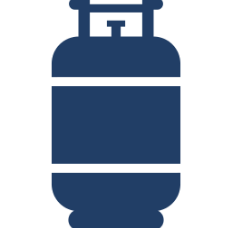Products > Anhydrous Ammonia
Anhydrous ammonia
NH3
Anhydrous ammonia (NH3), a potent and colorless gas distinguished by its sharp smell, is fundamental in creating numerous everyday products. As a concentrated variant of ammonia, it plays a pivotal role in several industrial uses. It is particularly vital in the production of fertilizers, the operation of refrigeration systems, and in the realm of chemical manufacturing, underscoring its importance in modern industry.

Grade
Commercial grade, Refrigerant grade

Tanker Capacities
6, 11, 15.8, 19, 21 tonnes

Tonner Capacities
400kg

Cylinder Capacities
50kg, 60kg

ISO Tank Capacities
11.5 tonnes
About the product
Discover the versatility of anhydrous ammonia, a key chemical compound widely utilized in industrial and agricultural sectors. Jaysons Chemical Industries, a leading name in ammonia supply in India, takes pride in offering top-grade anhydrous ammonia, expertly manufactured, bottled, and transported to meet your diverse needs.
Anhydrous ammonia, known for its colorless appearance and strong odor, is pivotal in numerous industries. Its applications extend from fertilizer production, essential in modern agriculture, to its use in refrigeration systems, pharmaceuticals, synthetic fibers, rubber manufacturing, and more. Recognized for its role as a nitrogen source for crops, anhydrous ammonia is indispensable in agriculture.
Understanding the critical need for reliable anhydrous ammonia sourcing, Jaysons Chemical Industries is dedicated to providing the finest quality at competitive prices. Our range of anhydrous ammonia products caters to both agricultural and industrial demands. Available in various quantities and packaging options, we ensure you find the perfect fit for your specific requirements.
So, why wait to explore our anhydrous ammonia offerings? Contact Jaysons Chemical Industries today and experience unparalleled quality and service in the world of anhydrous ammonia supply.
Why us?

High-Quality Anhydrous Ammonia Products

Competitive Prices

Range Of Packaging Options

Reliable Supply Chain

Timely Delivery

Expert Guidance
Anhydrous Ammonia
UN code: 1005
HSN code: 28141000
CAS number: 7664-41-7
IMDG class: 2.3
Applications of ammonia
- Ammonia nitrate fertilizer
- Refrigerant
- Water purification
- Plastic
- Explosives
- Fabrics
- Pesticides
- Pharmaceuticals
- As a stabilizer, neutralizer and a source of nitrogen in
- Waste and waste water treatment
- Cold storage
- Food and beverage industry
- Rubber
- Urea
Frequently asked questions
What is anhydrous ammonia used for?
Is anhydrous ammonia harmful to humans?
What is the difference between anhydrous ammonia and ammonia?
Is anhydrous ammonia liquid or gas?
Do farmers still use anhydrous ammonia?
Why is anhydrous ammonia so expensive?
Why do people steal anhydrous ammonia?
What happens if you breathe anhydrous?
What happens when anhydrous ammonia is mixed with water?
Can anyone buy anhydrous ammonia?
Why do farmers inject anhydrous ammonia?
What is another name for anhydrous ammonia?
What is trimethylamine anhydrous used for?
What is the subsidiary risk for anhydrous ammonia?
Where to buy ammonia solution?
Anhydrous Ammonia: Industrial Powerhouse and Agricultural Essential
Anhydrous ammonia, a critical chemical in both industrial and agricultural realms, stands out for its efficiency and versatility. As a colorless gas with a distinctive pungent odor, anhydrous ammonia is a pure, water-free form of ammonia, making it more concentrated and potent than its aqueous counterparts. ...In the industrial sector, it’s a cornerstone in the production of various products, such as fertilizers, plastics, explosives, and pharmaceuticals. Its role in synthesizing numerous compounds is unparalleled, often serving as a precursor for nitrogenous products. In refrigeration, anhydrous ammonia acts as an effective coolant due to its excellent thermodynamic properties, making it a popular choice in large industrial refrigeration systems.
In the agricultural field, anhydrous ammonia’s significance cannot be overstated. It is one of the most efficient and widely used sources of nitrogen for crop fertilization. This is vital as nitrogen is a key nutrient that supports plant growth and enhances crop yields. The application of anhydrous ammonia in the soil provides a direct and concentrated source of this essential nutrient, contributing significantly to global food production. Furthermore, with advancements in application technology, the use of anhydrous ammonia has become increasingly precise and efficient, ensuring optimal benefit with minimal environmental impact.
The multifaceted uses of anhydrous ammonia reflect its integral role in various sectors. Its ability to boost agricultural productivity while also serving as a fundamental building block in numerous industrial processes exemplifies its indispensability. With ongoing research and technological advancements, the potential applications of anhydrous ammonia continue to expand, promising further contributions to industrial innovation and agricultural sustainability. As a leading supplier, Jaysons Chemical Industries remains committed to providing high-quality anhydrous ammonia, understanding its crucial role in driving forward both these vital sectors.
